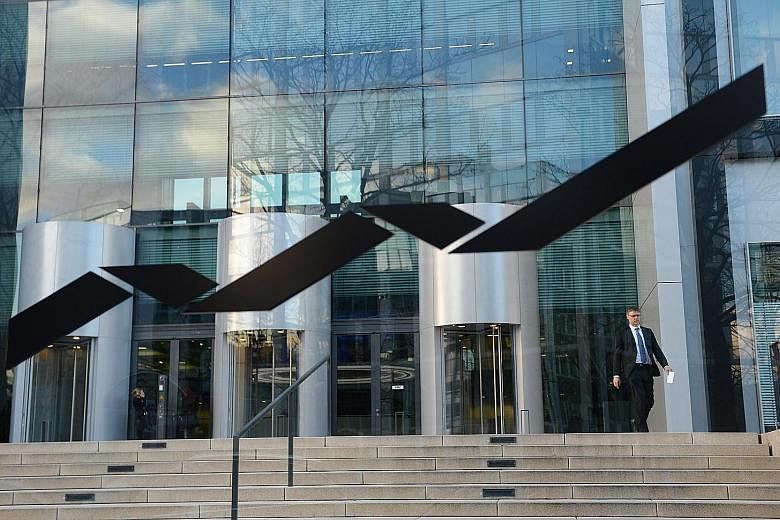FRANKFURT • Deutsche Boerse and the London Stock Exchange (LSE) are making a third attempt at a merger that would create a European trading powerhouse that could better compete against US rivals encroaching on their turf.
The deal would combine the LSE's share trading operation with the derivatives trading of Deutsche Boerse's Eurex in a group worth almost US$30 billion (S$42 billion). It would propel the companies to a similar scale as US exchange ICE, which has taken a huge slice of the European derivatives markets.
Nearly 16 years after their first attempt to merge, the London and Frankfurt exchanges yesterday confirmed they are holding detailed discussions on an all-share merger that would give Deutsche Boerse shareholders a 54.4 per cent stake and LSE shareholders 45.6 per cent of a new company.
Two sources familiar with the matter earlier told Reuters that the two were exploring a possible merger. One said the talks, using code names Delta for Deutsche Boerse and Luna for the LSE, were at an early stage. "There can be no certainty that any transaction will occur," said the LSE, whose boss, Frenchman Xavier Rolet, has long sought a strong presence in derivatives - a major growth area.
Under British takeover rules, Deutsche Boerse must either make an offer or announce it will not do so by March 22, unless it obtains an extension from the UK mergers regulator. A merger would create a group that spans derivatives, shares and indices - offering pan- European trading, clearing and settlement under one roof.
LSE owns LCH.Clearnet, one of the region's biggest clearing houses for euro-denominated securities, while Deutsche Boerse owns Clearstream, one of Europe's biggest settlement houses.
Deutsche Boerse, headed by chief executive Carsten Kengeter, also owns Stoxx indices, the most traded stocks futures in Europe, while the LSE owns the UK's FTSE and US Russell suite of indices.
Since their failed merger attempts in 2000 and 2004-5, neither the LSE nor Deutsche Boerse has been able to pull off a deal that transforms them into the dominant European bourse.
ICE, which owns the New York Stock Exchange, has, meanwhile, bought London derivatives trading platform LIFFE - presenting the two European firms with strong transatlantic competition.
US derivatives giant CME has also made inroads into the European market, while Chi-X - now owned by American BATS - has entered the fray to become Europe's biggest cross-border stock trading venue.
Mr Jonathan Goslin, an analyst at Numis Securities, said a deal should bring significant cost and revenue savings but added that there were several hurdles to get past before it could go ahead.
Competition concerns and the exchanges' differing views on how to structure their businesses are possible obstacles, as well as national pride. "Would the UK politicians be happy with the main UK exchange being owned by a foreign entity?" he asked.
REUTERS

